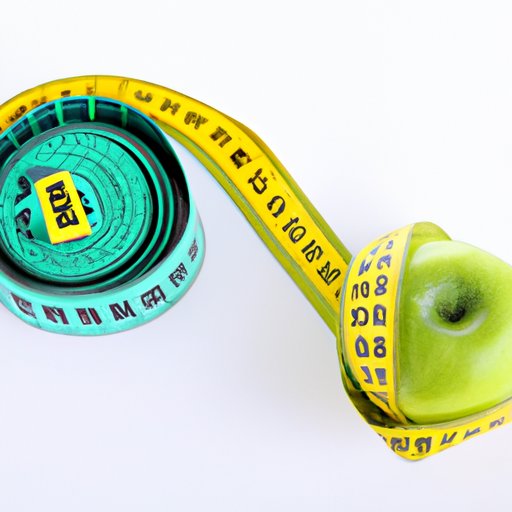
Introduction
One of the most common questions people have when trying to lose weight is how many calories they should eat a day. With so much conflicting advice and information out there, it can be tough to know what’s right for you. In this article, we’ll break down the facts about caloric intake and weight loss, helping you understand how many calories you should be eating to achieve your goals.
Picking the Right Caloric Intake: A Guide to Understanding Your Own Needs
First, let’s talk about why caloric intake matters when it comes to weight loss. Simply put, weight loss occurs when you burn more calories than you consume. However, individual caloric needs vary based on a number of factors, including age, gender, height, weight, activity level, and overall health. To determine your own caloric needs, you can use a variety of tools and resources, such as calorie calculators and food diaries. The key is to find the right balance of caloric intake that works for your body and your goals.
Decoding Caloric Intake: How Much Is Too Much If You Want to Lose Weight?
The basic principle of weight loss is creating a calorie deficit. This means that you’re consuming fewer calories than you’re burning, resulting in weight loss over time. However, it’s important to strike the right balance between too few and too many calories. Eating too few calories can slow down your metabolism and lead to muscle loss, while eating too many can prevent you from losing weight. A healthy and sustainable calorie deficit is typically around 500-1000 calories a day, which can lead to about 1-2 pounds of weight loss per week.
The Dos and Don’ts of Daily Caloric Intake: What You Need to Know
There are several practical tips you can follow to ensure you’re eating the right number of calories for weight loss. It’s important to track not only total calories but also macronutrients like protein, fat, and carbohydrates. This can help you ensure you’re getting the nutrients your body needs to support weight loss and overall health. Additionally, eating smaller, more frequent meals throughout the day can help you avoid hunger and cravings, while drinking plenty of water can also aid in weight loss. Finally, it’s crucial to maintain a balanced diet and incorporate regular exercise into your routine to support your weight loss goals.
Caloric Intake and Your Weight Loss Goals: How to Find the Sweet Spot
When it comes to weight loss, there are different approaches you can take, such as slow and steady versus rapid weight loss. The right approach for you depends on your individual needs and goals. However, the key is to find the right balance between caloric intake and weight loss that is healthy and sustainable for you. This may require some trial and error, but by tracking your progress and making adjustments as needed, you can create a plan that works for you.
How Many Calories Do You Really Need to Lose Weight? What the Experts Say
Research and expert opinions on caloric needs and weight loss can vary. However, many experts agree that a healthy and sustainable calorie deficit is around 500-1000 calories a day, which can lead to 1-2 pounds of weight loss per week. It’s also important to focus not just on caloric intake but also on overall nutrition and exercise. By approaching weight loss with a balanced and informed mindset, you can create a plan that works for you.
The Truth About Caloric Intake and Weight Loss: 5 Things You Need to Know
To sum up the main points of this article, here are five things you need to know about caloric intake and weight loss:
- Your individual caloric needs vary based on factors like age, gender, height, weight, activity level, and overall health.
- A healthy and sustainable calorie deficit is typically around 500-1000 calories a day.
- You should focus not just on caloric intake but also on overall nutrition and exercise to support weight loss and overall health.
- The right approach to weight loss depends on your individual needs and goals.
- By approaching weight loss with a balanced and informed mindset, you can find a plan that works for you and achieve your goals.
Conclusion
Losing weight can be a challenging journey, but understanding your own caloric needs is an important part of creating a sustainable and healthy plan. By tracking your progress, making adjustments as needed, and approaching weight loss with a balanced and informed mindset, you can achieve your goals and improve your overall health and wellbeing.




